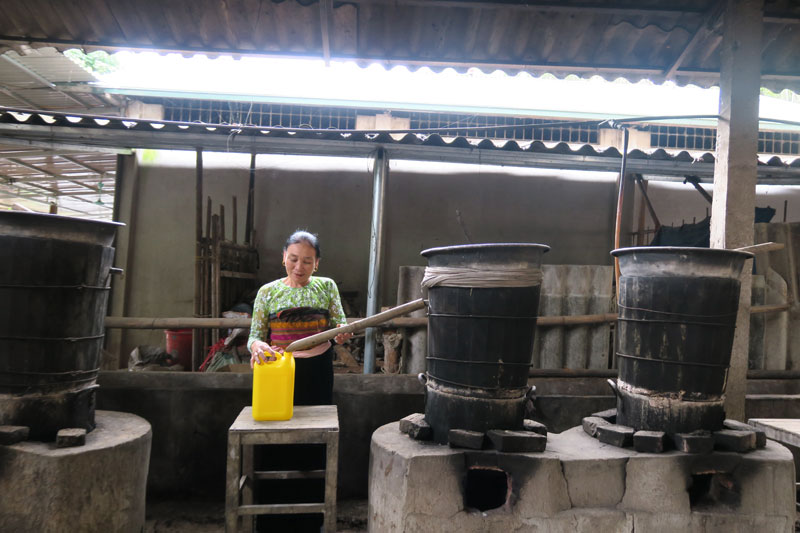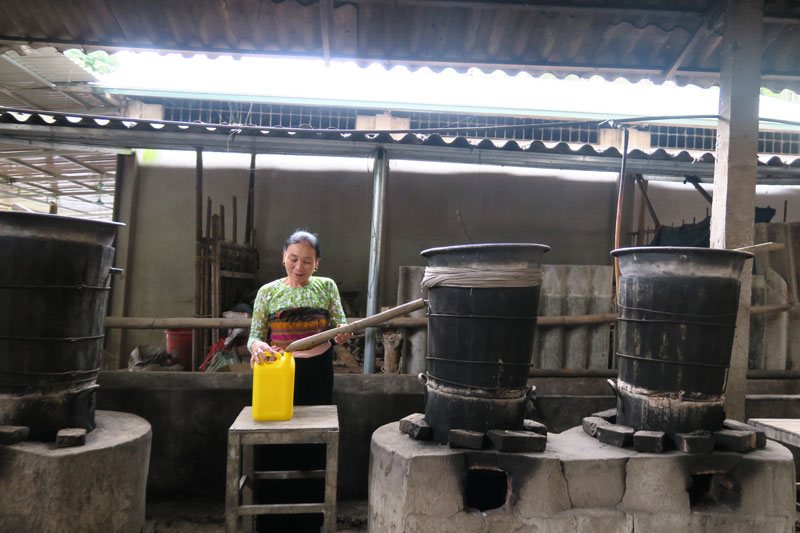
(HBO) – Mai Ha wine made with yeast from plants is a precious gift of Mai Chau forest in the northern province of Hoa Binh.
Ms. Vi Thi Ton from
Chieng Ha hamlet is preparing different types of leaves to make yeast for wine.
Mai Ha wine became available on the market in
the 1990s. The price of this wine is relatively high thanks to its special
flavour which comes from the local yeast made from leaves. As the demand is
increasing, Hung, a local, seized this opportunity to develop this trade to
increase incomes for his family.
Having done this trade for over 20 years, Vi Thi
Ton, Hung’s wife, shared that the most difficult step is to make the yeast
because more than 20 types of leaves, tubers and fruits are needed. The leaves,
tubers and fruits are picked in the forest, then washed, dried, crushed, and
sifted to get fine flour, which is then mixed with steamed flour from dried
cassava, corn and soybean, and left to ferment for about 20-25 days before
distilling wine. For the making of "ruou can” (fermented wine without
distilling), the fermentation process will be longer, at around two months.
Over the past time, Hung’s wine production
facility has welcomed hundreds of visitors who came to experience the
wine-making process and buy products right at the distillation place. Every
week, three to five tourist groups from Buoc hamlet (Xam Khoe commune), Lac
hamlet (Chieng Chau commune), and Long hamlet (Van Mai commune) come to enjoy
Mai Ha rice wine. Recently, Hung accepted the proposal of cooperation from
Herbal King Mai farm in Thung Khe commune, Mai Chau district, to supply wine for
the making of cordyceps wine to sell to tourists.
Forty-five households in Chieng Ha are engaged
in making wine. The hamlet is expected to be recognised as a traditional
wine-making village./.
The emulation movement "Hoa Binh joining hands to build new-style rural areas” has been widely spreading, becoming a driving force that motivates the localities to renew rural landscapes and improve the material and spiritual lives of the residents. In this movement, the people play a central role-both as the main implementers and direct beneficiaries of its outcomes.
In response to the global digital revolution, Hoa Binh Newspaper is transforming itself into a modern and multi-platform media hub, blending cutting-edge technology with a restructured newsroom and a new generation of tech-savvy journalists.
Hoa Binh province’s Association of the Elderly recently held a conference to review the project on expanding the inter-generation self-help club model until 2025.
In a move to implement Resolution No. 57-NQ/TW, issued on December 22, 2024 by the Politburo, which targets breakthroughs in science-technology development, innovation, and digital transformation, the Hoa Binh provincial Department of Health has issued a plan to roll out the "Digital Literacy for All” campaign within the local health sector.
An Nghia Commune (Lạc Sơn District) is one of the communes that achieved the tha standard of the national new rural area in 2018. Entering a new development phase, the commune is now trying to meet the criteria for the advanced new rural development. With the strong political will and the public consensus, the commune is gradually overcoming the challenges to reach this goal, aiming for the sustainable development.



